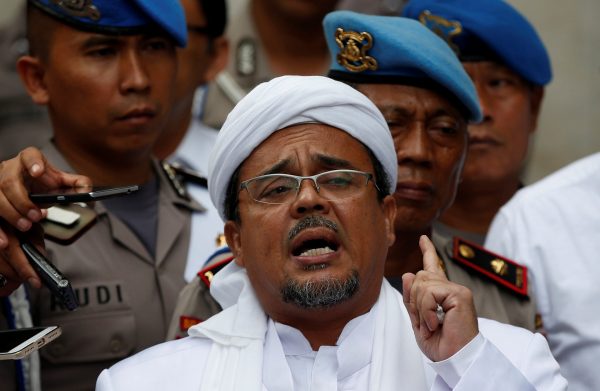The first argues that vigilantism and other non-state violent practices are a result of the Indonesian state’s failure to provide social protection for its citizens. This failure is considered a manifestation of the weakness of law enforcement in regulating society.
Such an explanation is influenced by views of the state as the only entity that monopolises the legitimate use of violence. This account emphasises the degree of state capacity in regards to maintaining social order.
When the state is weak, non-state violent groups emerge, substituting the state’s function in order making. Such violent groups will vanish when the state is strong. Vigilantism can thus be understood as a legitimate practice of civil society intended to fill the void of an absent state. Indonesian civilian militias — such as Islamic Defender Front (FPI), Betawi Brotherhood Forum (FBR) and Pemuda Pancasila — have indeed argued that they take the law into their own hands because of state absence.
The second perspective argues that the state is no longer the sole entity that uses violence with legitimacy. This is because state power has been dispersed and is no longer centralised. In the Indonesian context, the dispersal of authority in exercising violence is a result of the decentralisation of administrative power.
According to this perspective, fragmentation is the main feature of power in Indonesia, and power is always in contest. The existence of civilian militias is a manifestation of the fragmentation of power and is a challenge to the state’s monopoly over and centralisation of the legitimate use of violence. Militias are thus understood as autonomous agents in order-making. Unlike the state, which gains legitimacy through formal legal institutions, non-state actors achieve their legitimacy for using violence from public support because of state negligence.
This perspective is supported by the rhetoric of militia groups. For example, the idiom of nahi munkar (forbidding vice) or the rhetoric of anti-communism and defending the state ideology of Pancasila are some of the rationalisations used to gain public support and legitimacy for the FPI or Pemuda Pancasila.
Both of these perspectives provide important insights. Both emphasise the dispersal and subsequent constellation of power in decentralised democracy as a condition that makes possible violent actions by non-state actors. This has made both accounts fall into the same tendency in understanding democracy in relation to violence: democracy has provided freedom to all citizens, but this freedom has been hijacked by violent groups.
Non-state violence can exist in many political contexts: democratic or authoritarian, ‘weak’ and ‘strong’ state settings, and in cases of centralised and decentralised power. Indonesia under the former centralised authoritarian order also experienced civilian militias that served state interests.
This backdrop makes it clear that this phenomenon has little to do with state capacity or the form of power. Instead, it has much more to do with capitalist social relations in Indonesia, which require violence in the process of accumulating political power and economic resources.
Those features of capitalism in Indonesia that involve extra-economic coercion remain very similar to decades ago. Notably, money politics and political gangsterism remain major attributes of state practice. Decentralised democratisation has only changed the form of power, not the logic of Indonesian capitalism. In the new political context wherein politico-business elites compete with each other, civilian militias serve the interests of those contending predatory elites.
Many local leaders in North Sumatra, for example, are associated with or are even members of local youth gangs, like Pemuda Pancasila and Ikatan Pemuda Karya. These gangs provide muscle power ready for hire by politicians or business persons. This is primarily used in the expansion of economic activities that require land acquisition, such as plantations, infrastructure and property development. Gangs are hired to intimidate and suppress farmers and indigenous people. As the Agrarian Reform Consortium reported in 2016, the number of agrarian conflicts has risen since the Reformasi period.
Non-state violence is also hired by predatory elites to suppress labour strikes, such as in Bekasi in 2013. In this case, Pemuda Pancasila was one of the violent groups that was allegedly involved in attacking workers, with four labourers reportedly stabbed.
The recent Jakarta Gubernatorial election also illustrates that violent Islamic groups like FPI have a strong influence in the workings of Indonesian electoral democracy. FPI has contributed to mobilising religious sentiment by articulating racist rhetoric that was then used by secular elites to gain political support. Meanwhile, other political camps mobilised other violent groups like Banser, Nahdlatul Ulama’s militia wing, to defend Pancasila against supposedly rising Islamic radicalism.
These cases demonstrate that the prevalence of civilian militias is not because the state is unable to maintain social order due to the weakness of law enforcement. Civilian militias are far from being autonomous agents emerging out of the fragmentation of power — they are in service to contending politico-business elites. Civilian militias continue to exist because of the necessity of violence for capitalist accumulation in Indonesian. This necessity defined the former authoritarian-capitalist state in Indonesia and remains salient in the present-day democratic-capitalist state.
Abdil Mughis Mudhoffir is PhD Candidate at the Asia Institute, University of Melbourne and Lecturer at the Department of Sociology, Universitas Negeri Jakarta.

